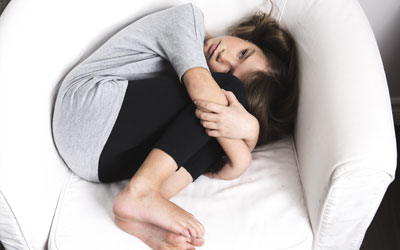What health issues impact teenagers?
Our teenage years are a time of immense change – physically, emotionally and socially. Sometimes other challenges, such as bullying, difficult family situations or financial problems, can make these changes harder to navigate.
It’s normal for teenagers and young adults to experience fluctuations in their moods. From stress and anxiety disorders to depression, young people can struggle with these heightened emotions. They might not have the experience or strategies that adults have for coping healthily. If these feelings are strong or persistent, it could be a sign of a mental health issue.
About 14% of teenagers have mental health problems, but most don’t receive the help they need. This can make it difficult for them to get along with family at home, perform well in school, or feel positive. It’s crucial for young adults and the people around them to be able to recognise when they need help. Accessing support early can make a substantial difference.
Certain groups, like young women and young people from less affluent families, are more likely to experience mental health issues. The number of young adults facing mental health issues is increasing, highlighting a significant need for better support.
Being able to get help from their families, schools, and communities is really important. Professional support, like hypnotherapy for young adults, can make a significant difference in helping them develop into happy and healthy people.
1 in 6 young people have experienced a mental health issue
25.1% of 13-18 year olds experience severe anxiety disorder
30% of 11-16 year olds with a probable mental health condition miss a week or more of school
Suicide is the leading cause of death for people aged 10-35
14–20 year olds have hypnotisability rates of 90%
What causes problems for young adults?
Mental health problems in young adults can come from a mix of different factors. During these years, the brain is still developing, making teens more susceptible to what’s happening around them. This can lead to incredible growth but also leave them open to stress and other negative influences.
Big life changes can be overwhelming for some young adults. These changes include moving to a new school, losing someone close, parents separating, or getting a new sibling. They can cause a lot of stress and anxiety, especially if they already feel vulnerable. Experiencing abuse, being bullied, living in poverty or facing discrimination can all impact a young person’s self esteem and confidence.
A family history of mental illness or other health issues can also contribute to mental health challenges.
Certain mental health issues might be seen more in boys or girls. For example, anxiety and depression are often reported at higher rates among young women. ADHD and issues with substance misuse are usually more common among young men. However, these patterns can vary, and it’s important to remember that mental health concerns can affect anyone.
Sometimes, young adults find it harder to cope due to a lack of support. Teenagers who don’t have a stable and loving family, a positive school environment, or a supportive community can struggle more. The stigma around discussing mental health and a lack of education on it can make young adults afraid to ask for help. They may not know where to get the help they need.
The impact of mental health challenges on teenagers
Our teenage years are often a time of growth and self-discovery, but they can also be incredibly challenging. Mental health conditions such as anxiety, depression, ADHD, substance misuse, eating disorders, self-harm, and even suicidal thoughts can weigh heavily on teenagers. These issues affect a young person’s emotional and physical wellbeing, plus academic achievements and overall development.
Sleep
Getting enough sleep is essential for teenagers, although many struggle. Lack of sleep can lead to increased irritability, difficulty concentrating, and a greater chance of making risky decisions. Over time, sleep deprivation can have serious effects on their physical and mental health.
Digital Worlds
Teenagers are more connected than ever and often spend a lot of time on social media. This can sometimes be a good way to connect with other young people and share their passions. However, excessive use can amplify feelings of anxiety and depression. For some young people, this can lead to real-life isolation and diminish social skills.
Parenting Influence
Supportive parenting helps teenagers build self-esteem and confidence to tackle challenges This helps them to develop healthily and achieve success – at school and elsewhere. Overly critical or neglectful parenting can make it harder for young people to manage mental health challenges. They may struggle to form other healthy relationships.
Diet and Nutrition
Nutrition significantly influences mental health, with poor dietary habits impacting mood and energy levels. This can also affect physical health and academic performance. In serious cases, eating disorders pose huge risks to physical health.
Social and School Environment
Not everyone’s school days are the best days of their life. The pressures of school life, including bullying and academic stress, can increase the risk of developing mental health issues. They can make it difficult to engage in schoolwork and socialising.
Substance Use
Some teenagers may turn to alcohol or drugs to cope with stress and anxiety. But this is only a short-term solution and often makes mental health problems worse. It causes long-term harm to both their physical and emotional health, and puts them at risk of trouble with the police.
Self-Harm and Suicidal Thoughts
These are serious signs of mental distress and need immediate support.
Young people can always get help straight away. Under 19s can call Childline on 0800 11 11 or use their online chat. Anyone under 35 can call Papyrus on 0800 068 4141 or text them on 88247. You can also call Papyrus if you’re concerned about a young person.
How can young adult issues be managed?
Supporting teenagers and young adults through mental health challenges involves open conversations and personalised care. Specialist mental health services (like CAMHS or young adult mental health clinics) are often overstretched, with long waits for assessments and treatment. This means it’s important to consider a range of ways for managing young people’s mental health.
Build support networks
It’s crucial for young people to feel supported in sharing their feelings, whether with family, friends, or professionals. Being able to speak to someone they trust is vital and confidentiality ensures both young people and their families feel safe.
Professionals (like doctors or therapists) usually keep things confidential unless there’s a serious safety concern. They should explain this clearly, so the young person knows what to expect.
Talking therapies
There’s strong evidence that teenagers can benefit from talking therapies or specialist young adults counselling. Cognitive behavioural therapy (CBT) helps young people understand how thoughts, feelings and behaviours are linked. Hypnotherapy for teenagers can support anxiety, phobias or stress-related habits like nail-biting or sleep problems.
Digital tools and journals
Mental health apps can provide coping strategies and anonymous support. Digital or paper journaling can also be a helpful way of expressing feelings.
Lifestyle support
Getting enough exercise, sleep and a balanced diet benefits everyone’s mental health – whatever their age. It’s good for young adults to get these habits in place early. Finding creative outlets like art, music and writing can help to regulate emotions. They can also be an easy way of finding joy on tougher days.
How can hypnotherapy help young adults?
Hypnotherapy for young adults provides the tools for teenagers and young people to manage their mental health challenges. Solution focused hypnotherapy helps young people visualise their ideal future and identify small steps towards achieving it. It draws on their own personal strengths, focusing on solutions rather than revisiting past trauma. This makes it ideal for addressing issues like exam stress, anxiety and even the emotional toll of social pressures.
Young people’s brains are highly flexible, which means they are particularly receptive to hypnotherapy. Sessions offer positive suggestions, so they can develop healthier thought patterns and behaviours. Young adults learn how their mental processes work, empowering them to better manage their thoughts and emotions.
Through guided relaxation, hypnotherapy helps young people clear their minds. By teaching them relaxation techniques that calm the mind and body, young adults can manage exam stress and anxiety more easily, with better focus. It offers a safe space for teenagers to explore their feelings and concerns. Our hypnotherapists then equip them with coping strategies that build resilience.
Hypnotherapy for young adults lays the groundwork for a lifetime of mental wellbeing. It offers a secure environment for young people to discover solutions and strategies. This builds resilience and provides a sense of accomplishment that boosts their self-esteem and confidence.
Hypnotherapy acts as a bridge to a healthier, more empowered future for children and adolescents. It equips them with the necessary tools to face life’s challenges with a positive mental attitude. This supports young adults’ overall wellbeing as part of their natural growth and development.


Our Young Adults Specialists
Why Choose Inspired To Change
Our solution focused hypnotherapists empower you to better understand your brain, helping to guide you towards solutions and achieve the outcomes you want. We have a team of fully trained hypnotherapists, giving you the choice of who to work with and how you want to work with them. Solution focused hypnotherapy is just as effective in-person or online in the comfort of your own home, so you can find the ideal therapist to help you reach your goals.
Every one of our hypnotherapists is recognised by governing bodies like the National Council for Hypnotherapy, the UK’s leading not-for-profit hypnotherapy professional association. They have all trained with Clifton Practice Hypnotherapy Training, one of the leading hypnotherapy schools in the UK.
















